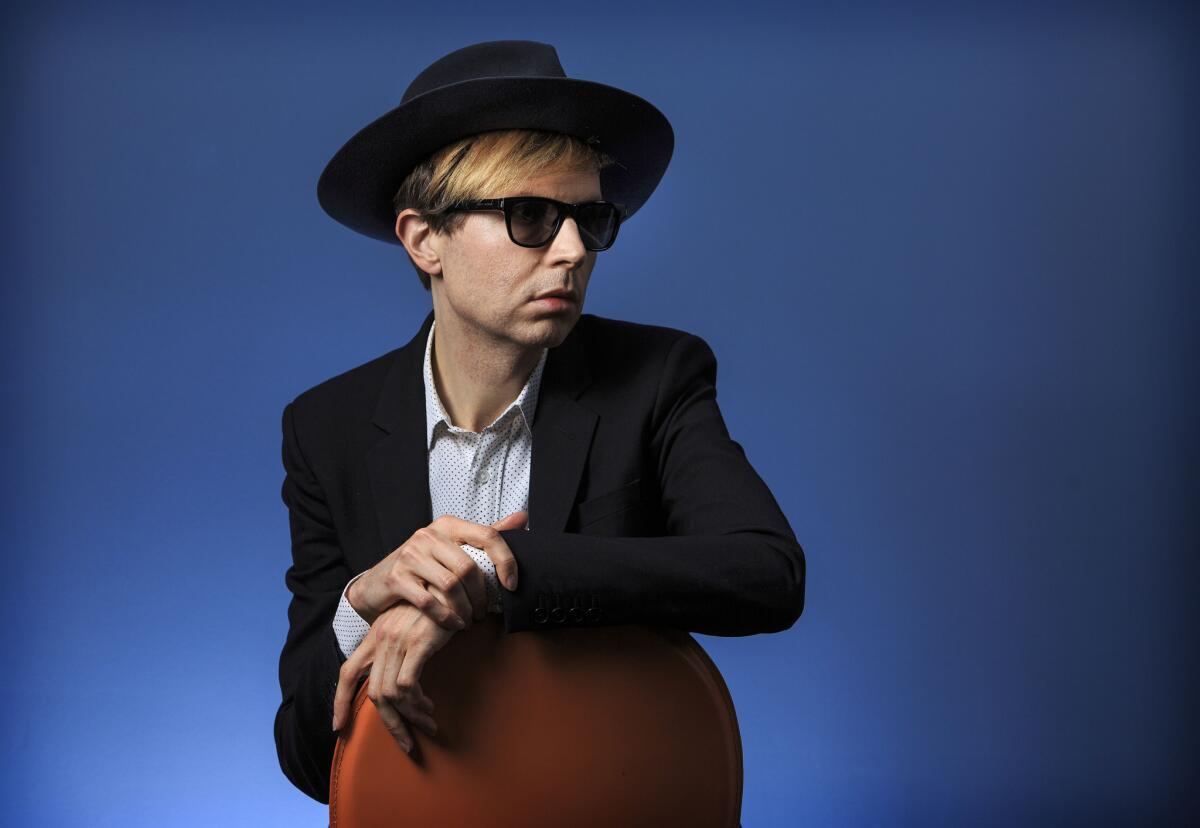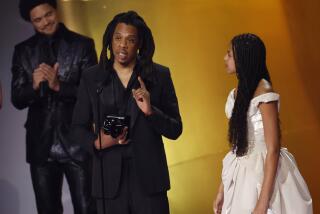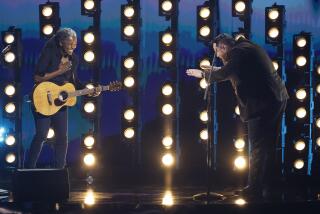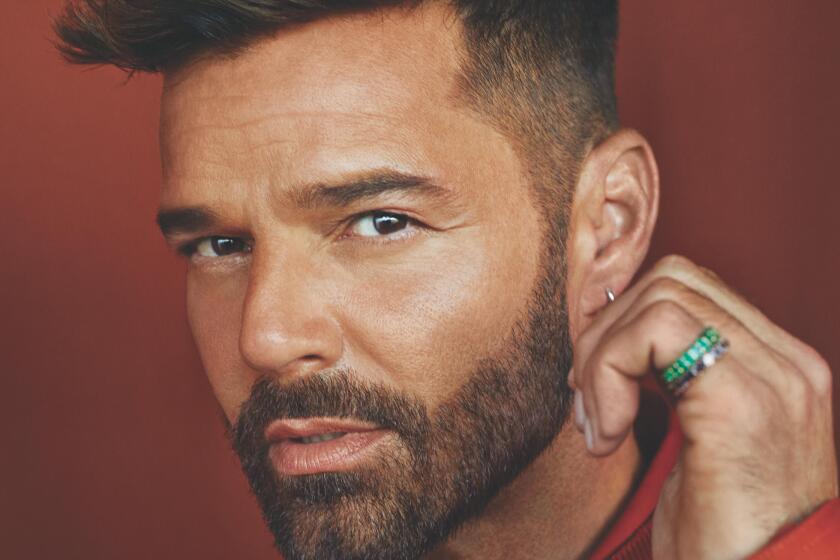Q&A: Grammys 2015: Beck discusses his album of the year nod

The last time Beck was in competition for a Grammy Award for album of the year he ended up one of several young acts – along with Eminem and Radiohead – to be shut out by an unexpected win by the veterans of Steely Dan.
Fourteen years later, Beck will be the veteran on Sunday night when the 44-year-old singer-songwriter goes up against Beyoncé, Sam Smith, Ed Sheeran and Pharrell Williams for the Grammys’ most prestigious prize. (Whether he manages to steal the kids’ lunches remains to be seen.)
FULL COVERAGE: Grammy Awards 2015
Beck, who’s also nominated in several rock categories, found Grammy favor again with “Morning Phase,” the lush, slow-rolling, psych-folk album he released in 2014 after spending several years concentrating on lower-profile projects such as “Song Reader,” a collection of tunes originally issued as sheet music.
Sitting in a trailer behind the Los Angeles Convention Center, Beck discussed “Morning Phase” and his Grammy nods between rehearsals for Sunday’s telecast (where he’s scheduled to perform with Chris Martin of Coldplay) and Friday’s MusiCares Person of the Year tribute to Bob Dylan.
“Song Reader” struck me as something designed with a small audience in mind. So did your production work on albums by Thurston Moore and Stephen Malkmus. But “Morning Phase” clearly connected more widely.
It’s strange how these things come together. As I was making the record, it felt like a very personal kind of project, something I was literally making at my house with these musicians who are like brothers to me. And then it came out, which was almost a surprise: “Oh, yeah, people haven’t heard this yet!”
I’ve heard many people say the album kind of seeped into their lives. It sticks with you.
That’s the best thing I could hear. And that’s something I think about. Not on all the records. The previous two, there was a lot of experimentation: “Let’s put these three things together and maybe a cool accident will happen.” But this time it came down to: How do you make something that you don’t just listen to once and then it’s on to the next? That’s the cycle we’re in now.
To my ears, that quality sets “Morning Phase” apart from the other album of the year nominees.
I don’t feel separate, though. My family, my friends, they listen to Beyoncé all the time. And I was working with Pharrell around the time I was working on this record, so he was at the house. In some ways it’s not so strange. This music, although it’s in different genres, it all feels like a part of my life. My record is a very kind of simple, traditional singer-songwriter record. But I guess the Sam Smith and the Ed Sheeran records are in that vein too.
They are, but I’d argue there’s a kind of stillness to “Morning Phase” that feels almost confrontational in a way. It openly resists that on-to-the-next thing.
It definitely comes out of a different rhythm. That period of time, those years leading up to when I was making it, the rhythm of my life completely changed. It was like a long period of – what do you call it?
Gestation?
That’s not the word, but, yeah, that’s true too. Some of the songs are fairly old.
Do they still feel current to you? They’ve stuck around, but when you’re asked to perform one at the Grammys, for instance, are you thinking, “Oh, man, I’ve gotta reach back in time here”?
No. But time and music are strange, because you’re constantly playing music that was made during a completely different period of your life. So there’s this sort of continuous now.
I saw some of your shows after “Morning Phase” came out, including at Coachella. You were actively mixing eras, which I didn’t necessarily expect.
We could’ve just come out and played the new record. But the idea was that we hadn’t done a proper world tour for years and years. And I had the band that I had through most of the ’90s and early 2000s, who’d spent years touring “Odelay” and “Midnite Vultures” and “Sea Change.” We wanted to touch on all of it, shed light on all these different records. And also I knew that there were a lot of people coming who’d never seen us play before. As long as I had them, it was, like, “OK, let’s do these songs properly,” you know? There’s nobody that can play “Odelay” like these guys. They lived it; it’s in our DNA at this point. But I don’t know if that was clear to people coming to the shows. We sort of suckered them into a full-on stage show.
GRAMMYS 2015: Complete list | Ballot | Top nominees | Guide | Timeline
Speaking of different eras, I looked at the 2001 Grammys on YouTube the other day. It seemed like a really long time ago.
See, that seems very recent to me.
You looked so young! You were basically Ed Sheeran then.
There’s definitely been a shift. I’d say the show has gotten younger in recent years. When I started, it was all veterans, so anybody I was in the category with were just giants. It’d be like Bruce Springsteen and Tom Petty and Bob Dylan. I was, like, “Can you guys make another category, please? Because there’s no way in hell I’m ever gonna win.”
Now you’re in the Springsteen/Petty/Dylan position.
Which is so strange. I remember during that time I couldn’t wait to get to be more of a veteran. I feel bad now in retrospect that I didn’t really enjoy that period of being a new artist. I acutely felt like I hadn’t earned being there. Now I feel we’re very much in a time of newcomers and whatever the new thing is.
You’ve often embraced that feeling of trying to do something new, often in a disruptive way.
That’s probably a good way to put it. “Things were going along fine without you, sir. Everything was going according to plan.”
And now you’re disrupting things again with a record that asks the listener to slow down.
It probably would have had more of a place 20 years ago. But I love that kind of time skew.
“Morning Phase” has been described as being timeless. Is that something an artist can aspire to?
I don’t know. I don’t think you get to choose. I’m sure if you talk to any middle-aged person about when Elvis came along or Little Richard, I don’t think they would’ve been saying, “This is classic music.” I don’t think we get to choose what’s going to be classic. Something that feels like a novelty right now could be the real classic in 20, 30, 40 years.
GRAMMYS 2015: Complete list | Ballot | Top nominees | Guide | Timeline
You’ve never seemed to look at music hierarchically.
Right. There’s so many artists that I hold in the highest regard that might be considered kitsch or just of their time, and I feel like they’re so grossly underappreciated. Maybe it’s a musician thing where you kind of listen through a different filter. You’re just trying to hear music without hearing where everything fits in.
Does it get harder to listen that way as you get older? You’re only becoming more aware of how things fit in.
It’s really hard. When I met Thurston Moore, he had that. This was the early ’90s, and Sonic Youth were kind of the kings and queen of a certain kind of music. They could’ve been up in their lofty position. But he was hanging out at the college radio station, you know? He had that kind of enthusiasm and complete freedom. That always stuck with me. I like that idea of trying to stay open.
Read more:
Quiz: How much music history do you know?
Transcript of Bob Dylan’s MusiCares Person of the Year speech
Diversity wins onstage but not in awards arena
Twitter: @mikaelwood
More to Read
The biggest entertainment stories
Get our big stories about Hollywood, film, television, music, arts, culture and more right in your inbox as soon as they publish.
You may occasionally receive promotional content from the Los Angeles Times.







